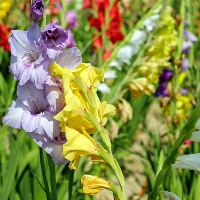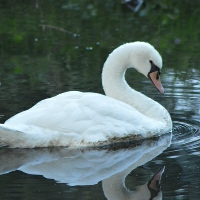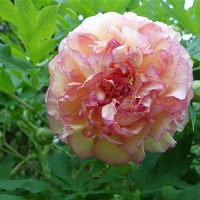The Turnip
there were once two brothers who both served as soldiers; one of them was rich, and the other poor. then the poor one, to escape from his poverty, put off his soldier's coat, and turned farmer. he dug and hoed his bit of land, and sowed it with turnip1-seed. the seed came up, and one turnip grew there which became large and vigorous, and visibly grew bigger and bigger, and seemed as if it would never stop growing, so that it might have been called the princess of turnips2(芜菁,红萝卜), for never was such an one seen before, and never will such an one be seen again.
at length it was so enormous that by itself it filled a whole cart, and two oxen were required to draw it, and the farmer had not the least idea what he was to do with the turnip, or whether it would be a fortune to him or a misfortune. at last he thought, "if thou sellest it, what wilt3 thou get for it that is of any importance, and if thou eatest it thyself, why, the small turnips would do thee just as much good; it would be better to take it to the king, and make him a present of it."
so he placed it on a cart, harnessed two oxen, took it to the palace, and presented it to the king. "what strange thing is this?" said the king. "many wonderful things have come before my eyes, but never such a monster as this! from what seed can this have sprung, or are you a luck-child and have met with it by chance?" "ah, no!" said the farmer, "no luck-child am i. i am a poor soldier, who because he could no longer support himself hung his soldier's coat on a nail and took to farming land. i have a brother who is rich and well known to you, lord king, but i, because i have nothing, am forgotten by every one."
then the king felt compassion4 for him, and said, "thou shalt be raised from thy poverty, and shalt have such gifts from me that thou shalt be equal to thy rich brother." then he bestowed5 on him much gold, and lands, and meadows, and herds6, and made him immensely rich, so that the wealth of the other brother could not be compared with his. when the rich brother heard what the poor one had gained for himself with one single turnip, he envied him, and thought in every way how he also could get hold of a similar piece of luck. he would, however, set about it in a much wiser way, and took gold and horses and carried them to the king, and made certain the king would give him a much larger present in return. if his brother had got so much for one turnip, what would he not carry away with him in return for such beautiful things as these? the king accepted his present, and said he had nothing to give him in return that was more rare and excellent than the great turnip.
so the rich man was obliged to put his brother's turnip in a cart and have it taken to his home. when there he did not know on whom to vent7 his rage and anger, until bad thoughts came to him, and he resolved to kill his brother. he hired murderers, who were to lie in ambush8, and then he went to his brother and said, "dear brother, i know of a hidden treasure, we will dig it up together, and spanide it between us." the other agreed to this, and accompanied him without suspicion.
while they were on their way, however, the murderers fell on him, bound him, and would have hanged him to a tree. but just as they were doing this, loud singing and the sound of a horse's feet were heard in the distance. on this their hearts were filled with terror, and they pushed their prisoner head first into the sack, hung it on a branch, and took to flight. he, however, worked up there until he had made a hole in the sack through which he could put his head. the man who was coming by was no other than a travelling student, a young fellow who rode on his way through the wood joyously9 singing his song. when he who was aloft saw that someone was passing below him, he cried, "good day! you have come at a lucky time." the student looked round on every side, but did not know whence the voice came. at last he said, "who calls me?" then an answer came from the top of the tree, "raise your eyes; here i sit aloft in the sack of wisdom. in a short time have i learnt great things; compared with this all schools are a jest; in a very short time i shall have learnt everything, and shall descend10 wiser than all other men. i understand the stars, and the signs of the zodiac, and the tracks of the winds, the sand of the sea, the healing of illness, and the virtues11 of all herbs, birds, and stones. if you were once within it you would feel what noble things issue forth12 from the sack of knowledge."
the student, when he heard all this, was astonished, and said, "blessed be the hour in which i have found thee! may not i also enter the sack for a while?" he who was above replied as if unwillingly13, "for a short time i will let you get into it, if you reward me and give me good words; but you must wait an hour longer, for one thing remains14 which i must learn before i do it."
when the student had waited a while he became impatient, and begged to be allowed to get in at once, his thirst for knowledge was so very great. so he who was above pretended at last to yield, and said, "in order that i may come forth from the house of knowledge you must let it down by the rope, and then you shall enter it."
so the student let the sack down, untied15 it, and set him free, and then cried, "now draw me up at once," and was about to get into the sack. "halt!" said the other, "that won't do," and took him by the head and put him upside down into the sack, fastened it, and drew the disciple16 of wisdom up the tree by the rope. then he swung him in the air and said, "how goes it with thee, my dear fellow? behold17, already thou feelest wisdom coming, and art gaining valuable experience. keep perfectly18 quiet until thou becomest wiser." thereupon he mounted the student's horse and rode away, but in an hour's time sent some one to let the student out again.
 四叶草的根 2024-04-19 12:59:21
四叶草的根 2024-04-19 12:59:21









